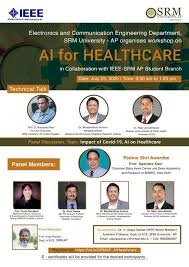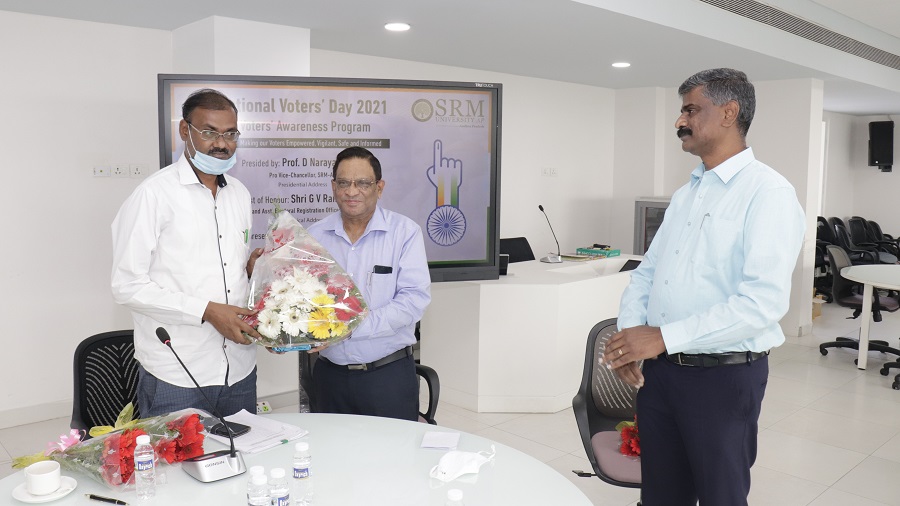Department of Electronics and Communication Engineering, SRM University-AP, Andhra Pradesh organised an insightful workshop on “Artificial Intelligence (AI) for Healthcare” in collaboration with IEEE-SRM AP Student Branch on 25th July. Prof. D. Narayana Rao, Pro-Vice-Chancellor, inaugurated the session.
Dr Muralikrishna Voonna, Managing Director, Mahatma Gandhi Cancer Hospital & Research Institute, and Dr Rajiv Janardhanan, Director, Amity Institute of Public Health, Professor ACVB participated in the technical presentation. Dr Voona delivered a lecture on “Impact of AI in Clinical Healthcare” whereas Dr Rajiv Janardhanan spoke on “Sustainable Healthcare: AI-enabled platforms for Affordable and Accessible Healthcare Solutions”.
Eminent panellists such as Padma Shree Awardee Prof. Upendra Kaul, Dr Pooja Ramakant, Dr Sunil Taneja, Dr Muralikrishna Voonna, and Dr Rajiv Janardhanan interacted on “Impact of Covid-19, AI on Healthcare” during the second half of the session. Prof. Priya Ranjan, Department of ECE, SRM-AP, acted as the moderator of the session.
 In his opening remarks, Prof. D. Narayana Rao asserted that healthcare in India faces significant challenges on quality, accessibility and affordability for a large section of the Indian population. “The shortage of doctors, lack of infrastructures, different mindset about the urban and rural population of the country and low government spending on the healthcare are very much motivating India towards innovative and sustainable and affordable technology to improve the quality of life,” said Prof Rao. AI is being extensively used in six healthcare segments such as hospital administration, pharmaceuticals, diagnostics, medical equipment and supplies, medical insurance and telemedicine. “Moreover, The Government of India also shows its keen inclination as in the past week, the Hon’ble prime minister Sri Narendra Modi had a discussion with the CEO of IBM regarding the development of AI-enabled medical instruments for healthcare in the country. Needless to say, there are a plethora of opportunities for new engineers and doctors,” opined Prof Rao.
In his opening remarks, Prof. D. Narayana Rao asserted that healthcare in India faces significant challenges on quality, accessibility and affordability for a large section of the Indian population. “The shortage of doctors, lack of infrastructures, different mindset about the urban and rural population of the country and low government spending on the healthcare are very much motivating India towards innovative and sustainable and affordable technology to improve the quality of life,” said Prof Rao. AI is being extensively used in six healthcare segments such as hospital administration, pharmaceuticals, diagnostics, medical equipment and supplies, medical insurance and telemedicine. “Moreover, The Government of India also shows its keen inclination as in the past week, the Hon’ble prime minister Sri Narendra Modi had a discussion with the CEO of IBM regarding the development of AI-enabled medical instruments for healthcare in the country. Needless to say, there are a plethora of opportunities for new engineers and doctors,” opined Prof Rao.
In his talk, Dr Murali Krishna Voonna confirmed that Artificial intelligence has a huge potential to become a transformational force in healthcare. It allows humans to gain unprecedented insights into diagnosis, care process, treatment variability and patient outcomes. Dr Voonna further informed that there is a huge scope for development in the segments such as brain-computer interface, next-generation radiology tools, creation of precise analytics for pathology images, expanding access to treat underserved regions, clinical decision support etc. to name a few. “NITI Aayog is working with Google to develop artificial intelligence ecosystems in India both in training and research. They have started a National Research Strategy for Artificial Intelligence recently. National Digital Health Authority has been formed as a regulatory body which is going to make the regulation in the Artificial Intelligence in start-ups and business and commercialisation of the products,” explained Dr Voonna.
In the opinion of Dr Rajiv Janardhanan, the healthcare disparity continued because the investments of the government in the years after independence is less than 2 %. COVID-19 has turned out to be a blessing for health care as it made people especially policymakers to realise that the healthcare infrastructure needs to be improved drastically. The AI-enabled intelligent support system is required because of budget constraints, rising costs of advanced medical treatments, increased complexity and cost of delivering healthcare, as well as increased expectations and demand for quality patient-centred healthcare. “India comprises of a healthcare ecosystem where 80% of the healthcare is expensive, and 70% of the population is living in rural areas with marginalised and inaccessible healthcare. This makes the rationale to develop tools which are community empowering,” asserted Dr Janardhanan. AI-enabled tagging of data can convert precision medicine to a community-centric new system which is called precision public health. This conversion has to be technology-enabled with support from the engineering fraternity to make it affordable and accessible.
During the second half of the session, the panel discussed the impact of COVID-19 on health immunity system. Padma Shree Awardee Prof Kaul explained in detail how COVID-19 disease affects the human body and the process of vaccination. He gave a detailed overview of how vaccines are prepared and the process of a clinical trial. He further shared the updated information on the COVID-19 vaccine with particular focus on India’s progress in making the vaccine. Dr Taneja and Dr Ramakanth expressed their views on COVID situation based on their daily experience at the hospitals. The panel agreed that the adoption of artificial intelligence (AI) in the healthcare system enables healthcare services, delivered at a lower cost with increased efficiency and emphasis on the diagnostics. AI should be encouraged to be used in machines to predict, comprehend, learn and act. It has the ability to play the role of game-changer in the areas of wellness, early detection, diagnosis, decision making, treatment, end of life, research and training. However, some concerns related to the safety, data quality, accountability, transparency, legal aspects etc. still persists.



